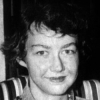Flannery O'Connor

Flannery O'Connor
Mary Flannery O'Connorwas an American writer and essayist. An important voice in American literature, she wrote two novels and 32 short stories, as well as a number of reviews and commentaries. She was a Southern writer who often wrote in a Southern Gothic style and relied heavily on regional settings and grotesque characters. Her writing also reflected her own Roman Catholic faith and frequently examined questions of morality and ethics. Her posthumously-compiled Complete Stories won the 1972 U.S. National Book...
NationalityAmerican
ProfessionNovelist
Date of Birth25 March 1925
CitySavannah, GA
CountryUnited States of America
Knowing who you are is good for one generation only. You haven't the foggiest idea where you stand now or who you are
Let me make no bones about it: I write from the standpoint of Christian orthodoxy. Nothing is more repulsive to me than the idea of myself setting up a little universe of my own choosing and propounding a little immoralistic message. I write with a solid belief in all the Christian dogmas.
Remember that you don't write a story because you have an idea but because you have a believable character.
Every morning between 9 and 12 I go to my room and sit before a piece of paper. Many times, I just sit for three hours with no ideas coming to me. But I know one thing. If an idea does come between 9 and 12 I am there ready for it.
It is a good deal easier for most people to state an abstract idea than to describe and thus re-create some object they actually see.
The idea of being a writer attracts a good many shiftless people, those who are merely burdened with poetic feelings or afflicted with sensibility.
In the greatest fiction, the writer's moral sense coincides with his dramatic sense, and I see no way for it to do this unless his moral judgement is part of the very act of seeing, and he is free to use it. I have heard it said that belief in Christian dogma is a hindrance to the writer, but I myself have found nothing further from the truth. Actually, it frees the storyteller to observe. It is not a set of rules which fixes what he sees in the world. It affects his writing primarily by guaranteeing his respect for mystery...
...the only thing that makes the Church endurable is that it is somehow the body of Christ and that on this we are fed. It seems to be a fact that you have to suffer as much from the Church as for it but if you believe in the divinity of Christ, you have to cherish the world at the same time that you struggle to endure it.
The operation of the Church is entirely set up for the sinner; which creates much misunderstanding among the smug.” (August 9, 1955)
Her name was Maude and she drank whisky all day from a fruit jar under the counter.
Satisfy your demand for reason but always remember that charity is beyond reason, and God can be known through charity.
Accepting oneself does not preclude an attempt to become better.
She would of been a good woman," said The Misfit, "if it had been somebody there to shoot her every minute of her life.
It's easier to bleed than sweat, Mr. Motes.